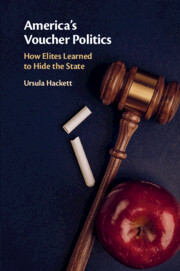Book contents
- America’s Voucher Politics
- America’s Voucher Politics
- Copyright page
- Contents
- Figures
- Tables
- Acknowledgments
- Abbreviations
- Introduction
- 1 America’s Foundational Identity Struggles
- 2 Two Dimensions of Attenuated Governance
- 3 The Racial Struggle
- 4 The Religious Struggle
- 5 The Public–Private Struggle
- 6 Tax Credit Scholarships in an Era of Republican Dominance
- 7 Education Savings Accounts and Controversies Beyond
- Conclusion
- Appendix
- References
- Index
3 - The Racial Struggle
Segregation Grants in the Brown Era
Published online by Cambridge University Press: 20 April 2020
- America’s Voucher Politics
- America’s Voucher Politics
- Copyright page
- Contents
- Figures
- Tables
- Acknowledgments
- Abbreviations
- Introduction
- 1 America’s Foundational Identity Struggles
- 2 Two Dimensions of Attenuated Governance
- 3 The Racial Struggle
- 4 The Religious Struggle
- 5 The Public–Private Struggle
- 6 Tax Credit Scholarships in an Era of Republican Dominance
- 7 Education Savings Accounts and Controversies Beyond
- Conclusion
- Appendix
- References
- Index
Summary
In America’s racial struggle, as racial egalitarian forces won new commitments from the federal government and judiciary during the Civil Rights Era, white supremacists found that they could not pursue their aims directly because they were liable to be struck down as unconstitutional. In an effort to protect a rigid racial hierarchy, southern states turned to tuition grant vouchers. These programs provided public money to individual parents to spend exclusively at private segregated academies. Instead of funding segregation directly, white supremacists funded it indirectly – through the intervention of parents and of “private,” arms-length financial assistance commissions whose job it was to administer the voucher payments on behalf of the legislature. But a change in legislative means reflected no change in ends. Despite their popularity among white parents, the contested-attenuated nature of segregationist tuition grants made them vulnerable to legal challenge as the Jim Crow system disintegrated. Remarking upon white supremacists’ inability to conceal their racist purposes, judges struck the programs down as unconstitutional. In their modern incarnations, vouchers are color-blind but have never fully shaken off the racial connotations of their segregationist forebears.
Keywords
- Type
- Chapter
- Information
- America's Voucher PoliticsHow Elites Learned to Hide the State, pp. 55 - 78Publisher: Cambridge University PressPrint publication year: 2020

